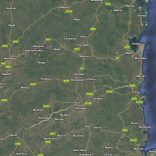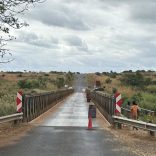Mozambique: At least three fishermen missing, feared abducted in Cabo Delgado
Food insecurity could affect around 3.3 million Mozambicans by March

FILE - For illustration purposes only. [File photo: Cnss.Gov]
Around 3.3 million Mozambicans could face food insecurity due to the impacts of climate shocks and armed insurgency in the country, according to an Integrated Food Security Phase Classification (IPC) report.
The document, which Lusa had access to yesterday, states that “the number of people in a situation of acute food insecurity and in need of urgent assistance (…) could increase from 2.79 million to around 3.28 million people, from October [2024] to March, 2025”.
According to the report, with data from 63 districts among those most affected by climate shocks, 773,000 people are also expected to face an “emergency” situation in the country.
“This could happen as a result of the depletion of food reserves and the impact of armed groups in Cabo Delgado and parts of Nampula and Niassa, as well as the effects of La Niña (…), mainly in the south and centre of the country,” the report reads.
The index, created by the Food and Agriculture Organisation of the United Nations (FAO), indicates that all provinces in the country will be affected, but with the emphasis on Gaza, Inhambane, Manica, Tete, as well as Cabo Delgado, which has been facing an armed rebellion since 2017, with attacks claimed by movements associated with the extremist group Islamic State.
The districts of Macomia and Quissanga, among those most affected by terrorist attacks, the intensification of the conflict and the limitations on access for humanitarian assistance could lead to an “emergency” situation, the document reads.
The last major attack in that northern province of the country took place on 10 and 11 May 2024, at the district headquarters of Macomia, with around a hundred rebels looting the town, causing several deaths and heavy fighting with the Mozambican Defence and Security Forces and Rwandan military, who are supporting Mozambique in fighting the attacks.
Mozambique is considered one of the countries most severely affected by global climate change, facing cyclical floods and tropical cyclones during the rainy season, which runs from October to April, but also prolonged periods of severe drought.
The United Nations estimates that food insecurity aggravated by El Niño has reached “unprecedented levels” in Mozambique, threatening almost five million people, in a scenario of drought and a lack of international funding for support on the ground.
According to a recently released report by the United Nations Office for the Coordination of Humanitarian Affairs (OCHA), the conclusions resulting from the analysis of agricultural activity and food insecurity indicate that “it has reached unprecedented levels in Mozambique”, with a total of 4,890,232 people threatened by this food insecurity by the end of the current agricultural campaign in March, 2025.
In 2024, that United Nations agency launched an appeal for US$222 million (€213 million) in international support to combat the effects of the drought in Mozambique, but acknowledges that it faces “a significant funding gap”, having raised only US$28.7 million (€27.5 million), equivalent to 13% of the identified needs.













Leave a Reply
Be the First to Comment!
You must be logged in to post a comment.
You must be logged in to post a comment.